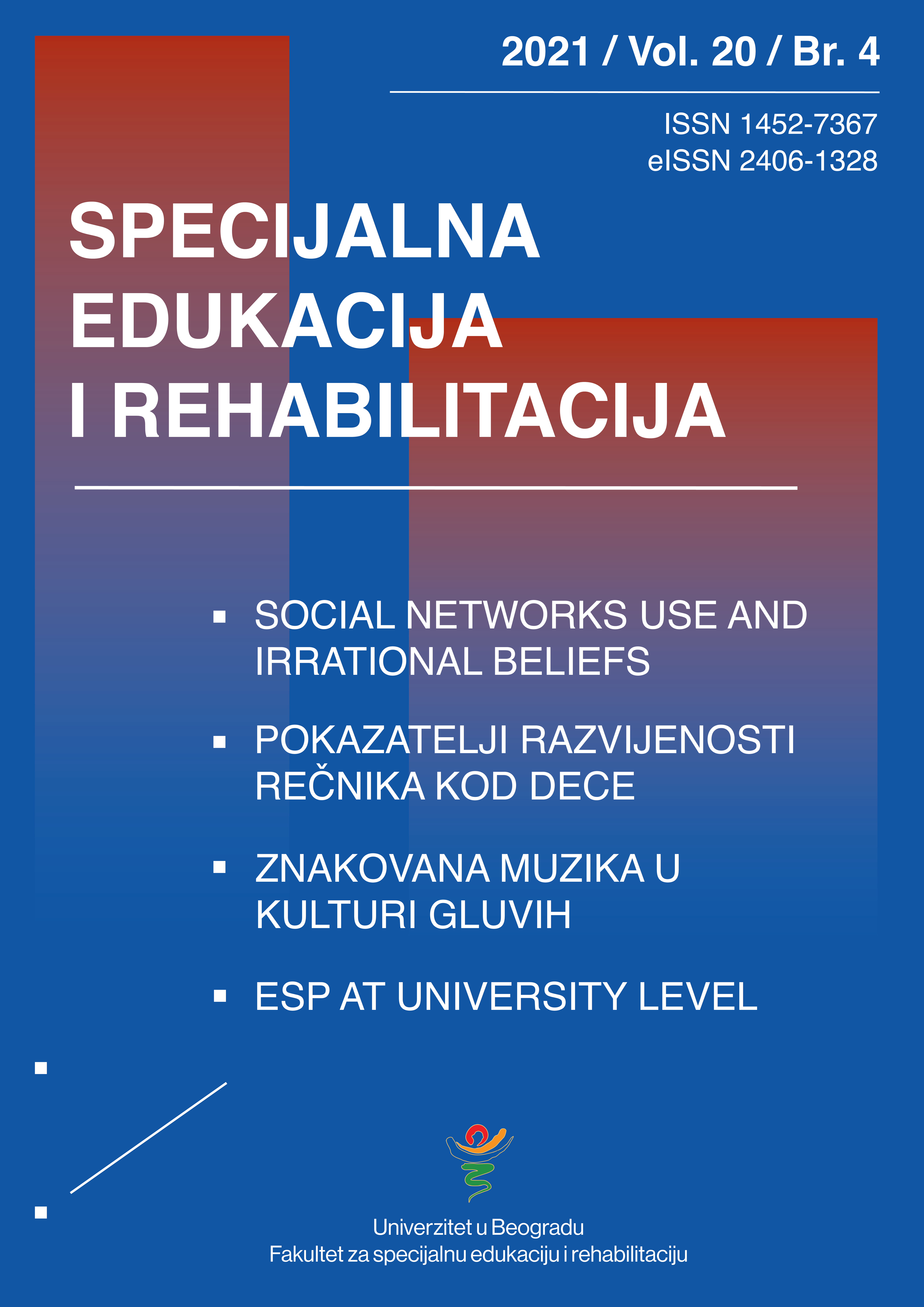Students’ attitudes toward ESP course at university level
Abstract
Introduction. English for Specific Purposes (ESP) at universities has a challenging goal of meeting the needs of usually large and heterogeneous groups of students. Objective. The aim of this study was to examine students’ attitudes toward the ESP course, acquired knowledge, and course materials at the Faculty of Special Education and Rehabilitation, University of Belgrade. In addition, the study examined the possible influence of students’ general English proficiency on the tested variables. Methods. An online questionnaire was used to collect data from 75 students who completed the ESP course in 2020 or 2021. Their general English proficiency was assessed by an online general English test. Results. The results showed that most students were satisfied with the acquired professional English language knowledge and available course materials and that their attitudes toward the completed ESP course were not influenced by their general English proficiency. Conclusion. These results are encouraging since they indicate overall student satisfaction with the ESP university course taught to a large class.
References
Arnó-Macià, E., Aguilar-Pérez, M., & Tatzl, D. (2020). Engineering students’ perceptions of the role of ESP courses in internationalized universities. English for Specific Purposes, 58, 58-74. https://doi.org/10.1016/j.esp.2019.12.001
Bekteshi, E., & Xhaferi, B. (2020). An analysis of English for specific purposes among university students. Educational Process: International Journal, 9(2), 90-102. http://dx.doi.org/10.22521/edupij.2020.92.2
Blagojević, S. (2013). Original texts as authentic ESP teaching material – the case of philosophy. ESP Today, 1(1), 113-126.
Cambridge Assessment English. (2021, October 30). General English. Cambridge University Press & Assessment. https://www.cambridgeenglish.org/test-your-english/general-english/
Chostelidou, D. (2011). Needs-based course design: The impact of general English knowledge on the effectiveness of an ESP teaching intervention. Procedia Social and Behavioral Sciences, 15, 403-409.
Council of Europe. (2001). Common European Framework of Reference for Languages: Learning, Teaching, Assessment. Cambridge University Press.
Cvetković, T., & Gorgiev, B. (2019). Analiza motivacije studenata prilikom izbora stranog jezika na nematičnim departmanima [Analysis of students’ motivation in choosing a foreign language course at non-affiliated departments]. Reči, 12, 54-68.
Day, J., & Krzanowski, M. (2011). Teaching English for specific purposes: An introduction. Cambridge University Press.
Dudley-Evans, T., & St John, M. J. (1998). Developments in English for specific purposes: A multi-disciplinary approach. Cambridge University Press.
Đorović, D. (2011). Veštine čitanja i razvijanja vokabulara za specifične potrebe u nastavi jezika struke na univerzitetskom nivou [Reading and vocabulary development skills in teaching language for specific purposes at university level]. Teme, 35(3), 819-836.
Đurović, T., & Silaški, N. (2010). Teaching genre-specific grammar and lexis at tertiary level: The case of economics students. Journal of Linguistic Studies, 3(1), 165-176.
Enesi, M., Vrapi, F., & Trifoni, A. (2021). Challenges of teaching and learning English language for ESP courses. Journal of Educational and Social Research, 11(4), 213-226. https://doi.org/10.36941/jesr-2021-0090
Glišović, I. (2014). Autentičan jezik u nastavi stranih jezika na nefilološkim fakultetima [Authentic language in foreign language teaching at non-philological departments]. In B. Dimitrijević (Ed.), Jezik, književnost i kultura [Language, literature and culture] (pp. 236-246). Univerzitet u Nišu – Filozofski fakultet.
Hoa, N. T. T., & Mai, P. T. T. (2016). Difficulties in teaching English for specific purposes: Empirical study at Vietnam universities. Higher Education Studies, 6(2), 154-161. http://dx.doi.org/10.5539/hes.v6n2p154
Ignjačević, A. (2008). Specifičnosti nastave stranog jezika struke [Teaching foreign language for specific purposes]. Nastava i vaspitanje, 57(2), 150-156.
Ivančević Otanjac, M. (2014a). The development of English for specific purposes syllabus for first-year students of special education and rehabilitation. Specijalna edukacija i rehabilitacija, 13(1), 107-115. https://doi.org/10.5937/specedreh13-5902
Ivančević Otanjac, M. (2014b). Teaching English grammar to students of special education and rehabilitation. The Journal of Teaching English for Specific and Academic Purposes, 2(2), 229-234.
Liu, J., & Berger, C. M. (2015). TESOL: A guide. Bloomsbury Academic.
Manić, D., & Vučo, J. (2015). Unapređivanje nastave stranog jezika struke u srednjim stručnim školama – CLIL i TBLT iskustva u projektu PETALL [Improving ESP in vocational schools – CLIL and TBLT experiences in PETALL project]. Primenjena lingvistika, 16, 79-88. https://doi.org/10.18485/primling.2015.16.6
Martinović, A., & Poljaković, I. (2010). Attitudes toward ESP among university students. Fluminensia, 22(2), 145-161.
Maasum, S. M. H. (2011). The role of general background in the success of ESP courses: Case study in Iranian universities. Literacy Information and Computer Education Journal (LICEJ), 2(3), 424-433.
Mićić, S., & Sinadinović, D. (2013). Teaching vocabulary to Medical English students – theory and practice. Primenjena lingvistika, 14, 39-49.
Nation, I. S. P. (2001). Learning vocabulary in another language. Cambridge University Press.
Richards, J. C. (2001). Curriculum development in language learning. Cambridge University Press.
Sarmento, S., Viana, V., & Bocorny, A. E. (2018). English for specific purposes (ESP). TESOL Press.
Wilson, J. (1986). Task-based language learning. In C. J. Brumfit, & D. Harper (Eds.), ESP for the university (pp. 27-64). Pergamon Press & The British Council.
Copyright (c) 2021 Specijalna edukacija i rehabilitacija

This work is licensed under a Creative Commons Attribution-ShareAlike 4.0 International License.

